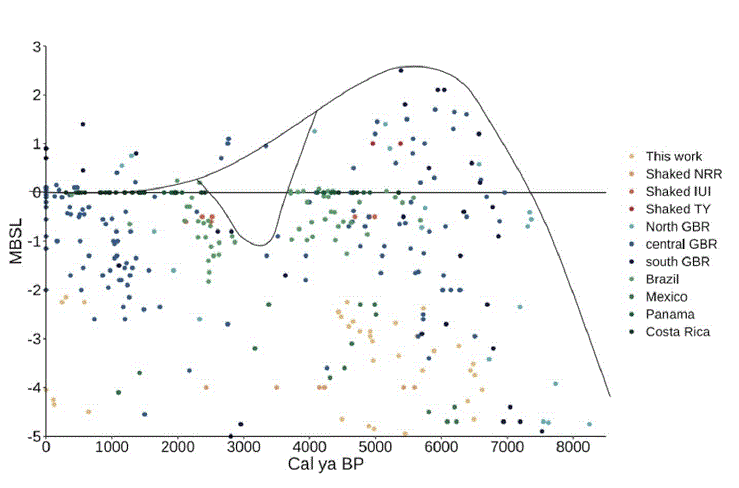Corals around the world stopped growing in 2000BC and the pause lasted two thousand years before they returned like the Phoenix.
Each polyp might be fragile, but coral ecosystems are the couch-grass of the oceans.
A new paper rather puts the man-made panic about corals into perspective.
The most terrible events that could happen to corals have already happened, and the corals appear able to bide their time for two thousand years and return in all their glory.
The worst thing for the worlds corals is not rising seas but falling ones.
We panic over the odd bit of bleaching here and there, but it’s nothing compared to mother nature. The shallow edges of the oceans of the world are savage places. And the best place to study this mayhem is the Red Sea. Not only is it hot, but long, thin, deep, and it’s tectonically active too. In the depths of the last ice age, it was cut off from the Indian Ocean and the salinity rose to a death defying 47% at the Southern end, and 57% in the north. For thousands of years, the Red Sea was pickled.
When the world finally warmed and waters came back 18,000 years ago, baby corals had to travel 2,400 kilometers from the Gulf of Aden to get to Eilat, at the far northern end of the Red Sea, yet they easily did. And the seas kept on rising for thousand of years, and that was all fine and dandy, until disaster struck 4,000 years ago when the seas started to fall, and presumably those delicate polyps were left to bake in the sun.
Feldman et al, studied this phenomenon in the Red Sea and noticed that other scientists have already reported coral growth stagnated in all the major oceans at roughly the same time. For two thousand years there are almost no new fossil corals in any of the cores they drilled. Then somehow, the distinct coral communities that had thrived long before, all reappeared.
Imagine if seas were falling by a few millimeters a year today? The government funded scientists would be raging against the falling of the tide. Whole institutes would be established to move corals to baby nurseries, or special zoos, or to set up seed banks, or to wall off whole reefs. People would be dreaming up schemes to heat the oceans…
But like couch-grass, we couldn’t kill the corals off in the oceans if we wanted to.
Thanks to Kenneth Richard at NoTricksZone for finding this paper:
In this study, we propose not just a local sea level condition causing specific reef turn-offs or hiatuses, but rather a global phenomenon of sea level fall. In light of our findings from Eilat and examining the reports from different locations around the globe (discussed above), we identify a global hiatus in reef growth between approximately 4000 and 2300 years BP (Figure 5). The available studies found almost no fossil corals dated to this time interval at sites across the Atlantic, Indian, and Pacific Oceans (Cortes et al. 1994; Dechnik et al. 2019; Gischler et al. 2008; Perry and Smithers 2011; Shaked et al. 2004, 2005, 2011; Toth et al. 2012),

FIGURE 5 | Reconstruction of global sea level—Compilation of radiocarbon dates from seven sites vs. mean below sea level (MBSL). Possible global sea level curve is presented with demonstrated fall between ~4000–2300 years BP.
Reading the paper is like trawling through an epic biblical drama. Corals want to grow near the surface to harvest the sunlight, so as the seas rise, they just grow upward. When seas stabilize they spread outwards. But the Red Sea has steep sides and the corals can’t expand far. The reef they studied at Eilat at the far northern end, was 1 kilometer long, but only 20m wide. Then just when those delicate corals get settled, a tectonic upheaval blows it away.

(d) Pictures of all seven cores extracted from the lagoon, reef flat and fore reef of the Nature Reserve in Eilat, and some of the coral species that have been found (e) A sketch of Eilat’s Nature Reserve coral reef with all seven extracted cores and their locations. Black arrows on core’s sides represent if were taken from the north (up) or south (down) jetty.
So Feldman et al drill all these cores, and find all the remnants of different species, but when they date the samples they discover there is a kind of Bermuda triangle there in the history of corals. All corals below a certain depth are 4400 years or older, and just above that they are 700 years old. For thousands of years on this reef, the corals were effectively dead.
At some point the corals must have been baked in the sun, and a millennia or two later, they have been reseeded. Perhaps a few remnants struggled on somewhere nearby, or maybe they come from a thousand miles away. But somehow they still came back. The whole ecosystem just resumes where it left off.

FIGURE 2 | (a) Core lithology and coarse coral community structure of all seven cores from the Nature Reserve Eilat. 14C dates (calibrates year BP) as well as U-Th dates are presented at the right side of each core. Dates in red represent age reversals. The upper dashed line separate between recent samples and 4000 yr. dated samples. The middle part separates the 4000 yr. dates and the 5000 yr. samples. Everything beneath the lower line is 6000 yr. and older. (b) Age depth model for cores NR05, NR07 and NR10. Measured ages are marked by colored symbols and error bars (dR = −8 and uncertainty = 33). The model is the black line with error in matching color. Accordingly, the hiatus spans between ~4400 y cal BP and ~ 700 y cal BP.
Spare a thought for all those poor little polyps when the next real crisis comes and we get another Ice Age. Spare a thought for us, too…
REFERENCE











Yes, and the polar bears are just fine as well.
130
So what happened to our GBR when SLs started to drop on our east coast about four thousand years ago?
We know that SLs today are about 1.5 metres lower than 4,000 years ago or at the end of the Holocene climate optimum.
Of course during the last full glaciation SLs dropped over 100 metres over most of the globe. And that last glacial maximum lasted for about 90,000 years.
90
From 4000 years to the present, sea level has been fairly stable even though the planet was cooling.
ENSO was less intense during the Holocene Climate Optimum.
00
Spent a day* swimming in and around the Sinai Peninsula’s Blue Hole, down the arid desert coast from Eilat in the Gulf of Aqaba. The previous fortnight I’d been swimming above corals off Bali, Indonesia: tropical or desert, those resilient little polyps will grow anywhere they can (but not Scotland, quite a bit of snow but no corals there in ‘summer’).
Jo, free proofreading hint: if we wanted to, not ‘too’, plus world’s.
*1986
[Ahem, yes, saw that myself when I woke up. 🙁 Doh. — Jo]
70
A bit of “rock-doctoring” raises a whole slew of different questions. Marble is a metamorphi rock. Basically Limestone thet has been heated and compressed. Neither process likely to occur underwater, near the surface.
Limestone is generally compressed coral; compacted but not “heated”.
Corals of one sort or other have been endemic in “warmish” oceans for a LONG time.
But then we get to noticing that the crustal plates have been slowly tap-dancing all over the place for even longer, and they are still at it.
Where, relative to the “South Pole”, was the Australian Plate a few, (or more), million years ago? Crustal plates move, but not just laterally. various “lumps and bumps see them moving vertically as well
The planet is NOT preserved in aspic for all time.
The only reasonable “debate” has been between the “Gradualsts” and the “Catastrophists”; slow but steady change vs intermittent “outbursts” of major activity. Possibly BOTH have their place and time.
80
Great Bruce, Now we have both sides of the end of the world to worry about.
Thanks for that.
10
G’day Bruce,
Those plates have been dancing very slowly indeed, and I suspect even their quickstep didn’t affect the events Jo has described. But is there one, or some you know about that might have?
10
Also this confirms the obvious reason for coral bleaching.
The Great Barrier Reef is about 2500km x varying but up to 250km. It is the size of Germany. It has geography, rivers, lakes, seas, topography and it is subject to rising and falling tides and storm surges and evaporation. It is a complex ecosystem. But if the water falls, the coral near the surface is exposed to the burning sun in the tropics. And dies.
That this should happen is not a mystery but obvious. The idea that it is caused by warming oceans is absurd. The reef covers a huge range in temperatures as it is aligned North/South and has its own oceans and ecosystems with warmer water on one side of the inner reef and half the planet of water 4km deep on the outer side. The opportunism of the activists is the only reason anyone suggests that a living structure which has been there from Roman times is suddenly under threat from an average temperature change of a degree? The real reason is in the many billions of dollars fixing something which doesn’t need fixing. Apparently all the planetary climate and ocean systems as controlled by the UN. It’s ridiculous.
So Malcolm and Lucy, where is the $444Million you stole to ‘fix’ the Great Barrier Reef when Blind Freddy knew it didn’t need fixing and even if it did, that money would do nothing? And it’s in fine shape today, only a few years later. So do we get any change? Where’s the money? And what about the $14million in the budget each year as interest on the stolen money? Or are you too busy lecturing Donald Trump on how to run a country?
130
I guess it’s nothing to Albanese’s spending $A1billion cash on shares in a wildly speculative California company for a ‘Quantum Computer’, just when IBM is getting out and they invented it.
If someone actually had $1Bn of their own money, they wouldn’t do it. So where’s the return? Where’s the business plan? When is parliament going to know what is going on and who actually benefits from this massive gift of cash? Can we sell the shares and get the money back? Will we get a report to parliament on the ‘investment’?
It looks like Prime Ministers in Australia can do as they please with our money, with zero accountability. And aren’t they loving it.
Saving the planet, saving the Great Barrier Reef, saving jobs, saving aborigines. Only costing hundreds of billions of our dollars. A huge cost, but our leaders tell us it is necessary while they plan their retirement. And somehow nothing seems to work and the money just vanishes.
100
And the Great Barrier Reef is about 2℃ warmer at one end (near PNG) than the other.
And coral bleaching was first documented in 1865.
10
Spare a thought for Peter Ridd who was sacked by James Cook University in 2018 after he criticized his colleagues’ research on the Great Barrier Reef and questioned the impact of climate change on the reef. I’d still like to know what GBR Authority did with Malcolm Turdballs largess of 500 million $$$$ just prior to his departure
60
The $444million was not given to the GBR Authority. It was given to his wife, Lucy Turnbull and her friends who had formed a little committee of friends to save the reef.
Luckily her husband has a lazy $444million lying about, just when get got the sack as Prime Minister. The company secretary, one of six employees, had not applied for the money and had absolutely no idea what to do with it. Or so she told the press. But after a week she could say definitely that the cost of spending the money would be $132million, except she called it ‘administration’. And we the people have not heard a thing since.
Why is this not criminal activity?
100
* Correction: It was the Great Barrier Reef Foundation, not Authourity.
And strangely they called this $444 million of taxpayer money an “investment”. But in what? Presumably “someone” who’s close to Turnbull… Because it certainly wasn’t needed for the Reef which didn’t actually need saving.
https://www.barrierreef.org/news/media-release/record-investment-in-the-great-barrier-reef
10
The Australian National Audit Office, that’s meant to work for taxpayers not politicians, actually looked at this grant of an enormous amount of taxpayer money.
Not surprisingly, they pretended to find a little bit wrong but no one gets punished and it’s “nothing to see here”.
https://www.anao.gov.au/work/performance-audit/award-4433-million-grant-to-the-great-barrier-reef-foundation
20
As I keep saying, the Left/warmists have an Aristotlean view of the world as static and never changing.
They do not know that the world and its geography and climate are constantly changing for a wide variety of natural reasons.
They even used to teach that in schools, back in the day.
30
I’d be interested in Professor Peter Ridd’s thoughts on this!
50
It is rumored that Kenneth Richard (NoTricksZone) never sleeps.
10
What’s your excuse for “too” in the headline Jo? I suppose, being part of the page’s title, it is irremovable –please show me I’m wrong.
00
Perhaps the title can be changed independently of the URL?
00
No grammar checker in the headline (can you believe). Fingers type on autopilot.
Also I thought this post would be a short and simple one, but I had to read and re-edit multiple times. last edit was 5.51am. (Must fix body-clock).
Sometimes I have an idea and write because I think I know what the main emphasis of an article is. But as questions arise in my mind I have to go back and re-read the paper, then rewrite the article.
The “too” is in the url. I could, but won’t change it. Most people won’t see the url, and the search engines aren’t looking for “to” or grammar. But if people are emailing the link out, maybe it does matter. Perhaps I need a tiny-url?
10
Fun Fact about Coral.
My wonderful wife Barbara was hanging out for her 40th wedding Anniversary, given that, due to her medical condition, was almost 20 years longer than doctors had given her. That 40th Anniversary was our Ruby Anniversary, and when it finally did arrive, she got the whole deal, ruby earrings, (two sets) a ruby brooch, a ruby ring, and a ruby necklace, and she made an extra two years after that, now hanging out for the 45th Anniversary, the Sapphire gift.
In preparation and not really thinking she may make it, some years earlier, I went and researched wedding anniversary gifts. The Traditional ones were the original, and they started in the UK. Later on, as expected, the U.S. came in and made their own list of Anniversary gifts, you know, a little more ‘splashy’ in nature.
So, for our 35th wedding anniversary, I took her down to Yeppoon, and into a gift shop I had already teed up. Up to the counter, and told her to take her pick.
Umm, what of, was the response.
These lovely coral mementoes, as coral was the 35th wedding anniversary according to the original English version of the gifts.
Umm, 35 years, and all I get is some ….. coral.
Slightly offended now, after all that research, I mentioned that the American gift was Jade
Yes Please!!
These days coral is considered almost commonplace. However, when the original anniversary gifts were devised in the 19th Century, the English Navigators had only recently brought coral back to England and it was considered to be quite rare, and indeed valuable, so it was ‘up there’ in the rankings of the ‘high end’ anniversary gifts.
So, she ended up with some Jade. I still have the Jade Obelisk she gave me as my anniversary gift.
Funny how the perception of things changes over time.
Tony.
70